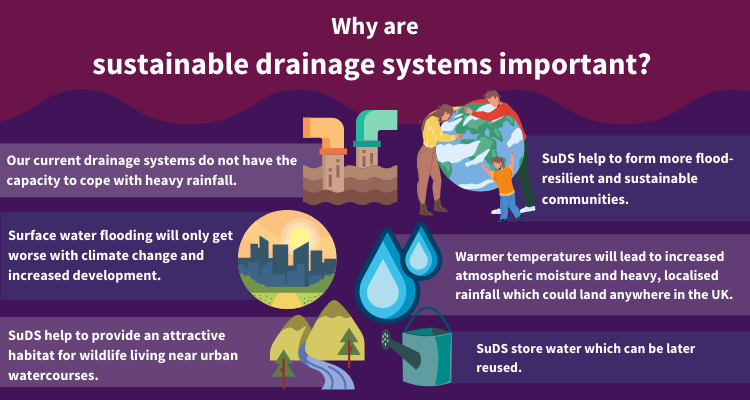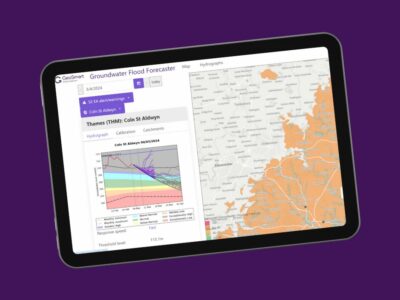Sustainable drainage systems: the key to reducing flooding and river pollution?
Contents
- What are sustainable drainage systems?
- What are the environmental benefits of sustainable drainage systems?
- What are the humanitarian benefits of sustainable drainage systems?
- How are sustainable drainage systems incorporated into planning legislation?
English rivers are a “chemical cocktail”, according to a parliamentary report which revealed just 14% meet a good ecological standard – the fourth consecutive year this statistic has remained unchanged.
Published in January 2022 by The Environmental Audit Committee, the report also reveals the government is not on track to ensure all rivers achieve a good status by 2027, with agricultural pollution, sewage and wastewater and urban diffuse pollution being the main contributors to the poor health of our watercourses.
However, according to the chief executive of the Environment Agency, Sir James Bevan, tackling climate change is key if we are to improve the water quality of our rivers.
Addressing the All Party Parliamentary Water Group last week, Sir James warned our altering climate will lead to heavier rainfall, which will overload sewage systems, increase discharges into rivers and overwhelm urban drainage systems. Ultimately this will lead to rising surface water flooding in our towns and cities.
This makes for uncomfortable reading, but the government is now starting to look at preventative measures, with reports that solid paved driveways could be banned.
The reason behind this is that sealed, urbanised surfaces stop excess rainwater from soaking through the ground, thereby increasing the likelihood of flooding.
Instead, sustainable drainage systems (SuDS) should be implemented, where possible.
Both natural managers of stormwater and environmentally-friendly, SuDS reduce the risk of flooding, maintain pollution control and build more adaptive communities.
What are sustainable drainage systems?
Designed to mimic natural drainage systems, sustainable drainage systems work by capturing rainwater and allowing it to soak into underground permeable areas – a process called infiltration.
The other way is via retention systems, which slow down the rate at which water enters watercourses.
Controlling water quality, amenity and biodiversity, SuDS channel surface water away from town and city drainage systems, subsequently reducing the amount of polluted rainwater and sewage pollution being swept into natural waterways.
Different types of sustainable drainage systems include:
- Linear wetland – gullies leading to a wetland downstream, where excess water is stored and vegetation aids the breakdown of pollutants.
- Permeable paving – by implementing gravel and porous pavement in urbanised areas, water can soak into the ground rather than cause surface water flooding.
- Swales – a shallow vegetated channel that collects water runoff from a road and delivers it to a storage pond.
- Wetland and retention ponds – a valuable ecological amenity into which swales and channels can drain.
What are the environmental benefits of sustainable drainage systems?
SuDS are brilliant for maintaining rivers’ natural flow regimes and protecting the habitats of local wildlife – they offer a variety of species, food, shelter and space for breeding.
Essential for the continued conservation and prosperity of our wildlife, these eco-friendly systems have the potential to increase the range of species present and opportunities available for them.
Sustainable drainage systems also provide great opportunities for evapotranspiration, a key element of the water cycle combining both evaporation and transpiration.
Evapotranspiration is an organic rainwater disposal system which occurs naturally in wetlands, swales and retention ponds, where stored water moves through vegetation into the atmosphere.
It is a process which will become a vital protector for many communities given the Met Office‘s prediction of heavier rainfall and overwhelmed urban drainage systems; SuDS will be life-savers.
What are the humanitarian benefits of sustainable drainage systems?
The UK population is growing and is predicted to reach 72 million by 2041.
There is already a need for more housing and this will continue, which means SuDS are becoming increasingly important.
More significantly, SuDS will be a crucial ally as we face climate change due to these systems not requiring energy or pumping to function, relieving the demand on sewage systems and downstream water treatment.
Working to strengthen the prevention of river pollution, SuDS additionally create attractive corridors in development and improve quality of life by connecting people to the environment, water and open space.
How are sustainable drainage systems incorporated into planning legislation?
According to the latest National Planning Policy Framework, development in areas at risk of flooding should only be permitted if it includes SuDS – unless there is evidence that demonstrates their use as inappropriate.
Paragraph 169 of the policy says major developments which include SuDS should ensure these systems provide multifunctional benefits, are maintained sufficiently over their lifetime, incorporate any advice from lead local flood authorities and meet the proposed minimum operational standards.
SuDS are a crucial tool for us to limit and prevent the humanitarian and environmental problems caused by surface water flooding in the future.
Explore our SuDS reports here or contact us below.




